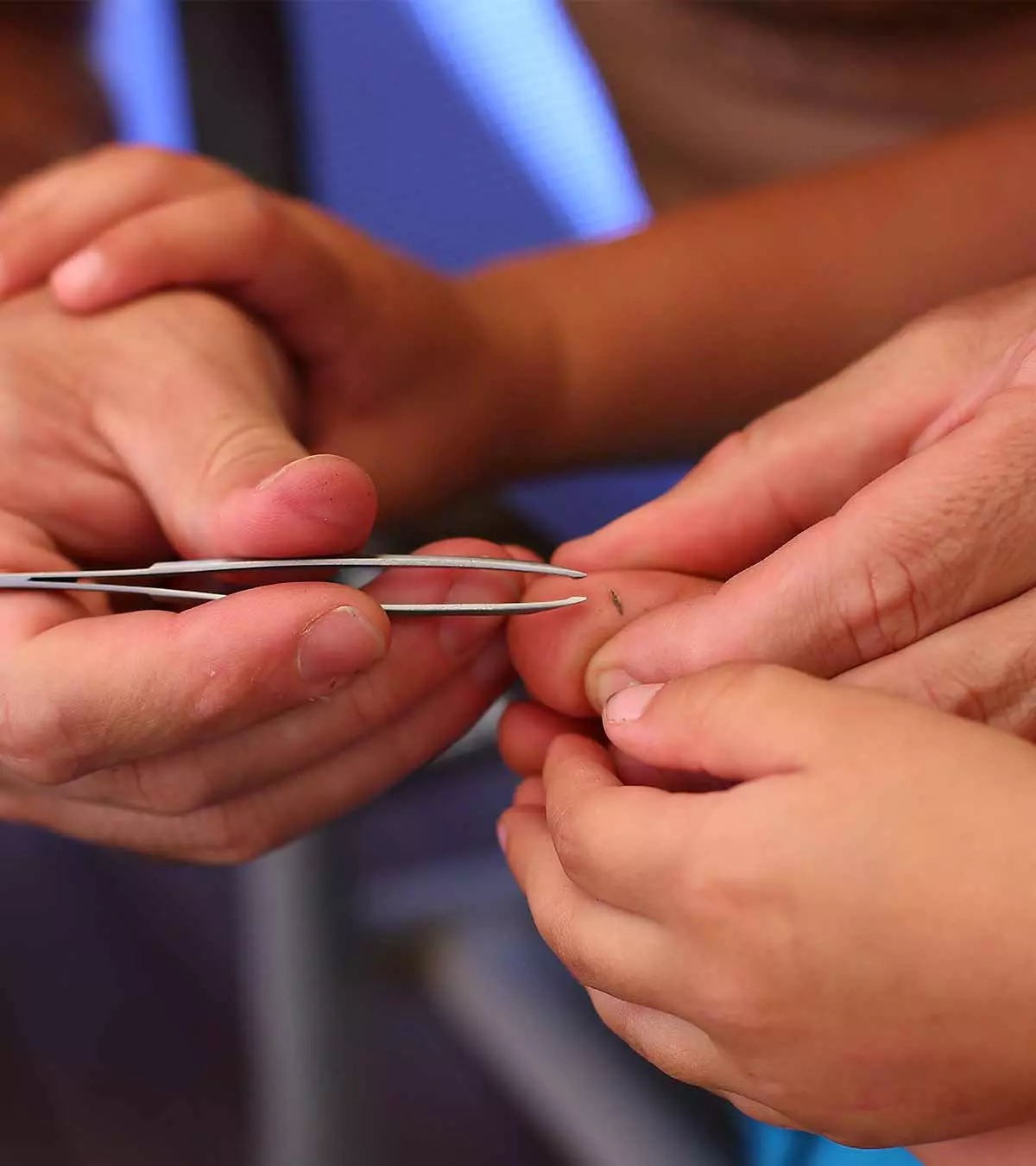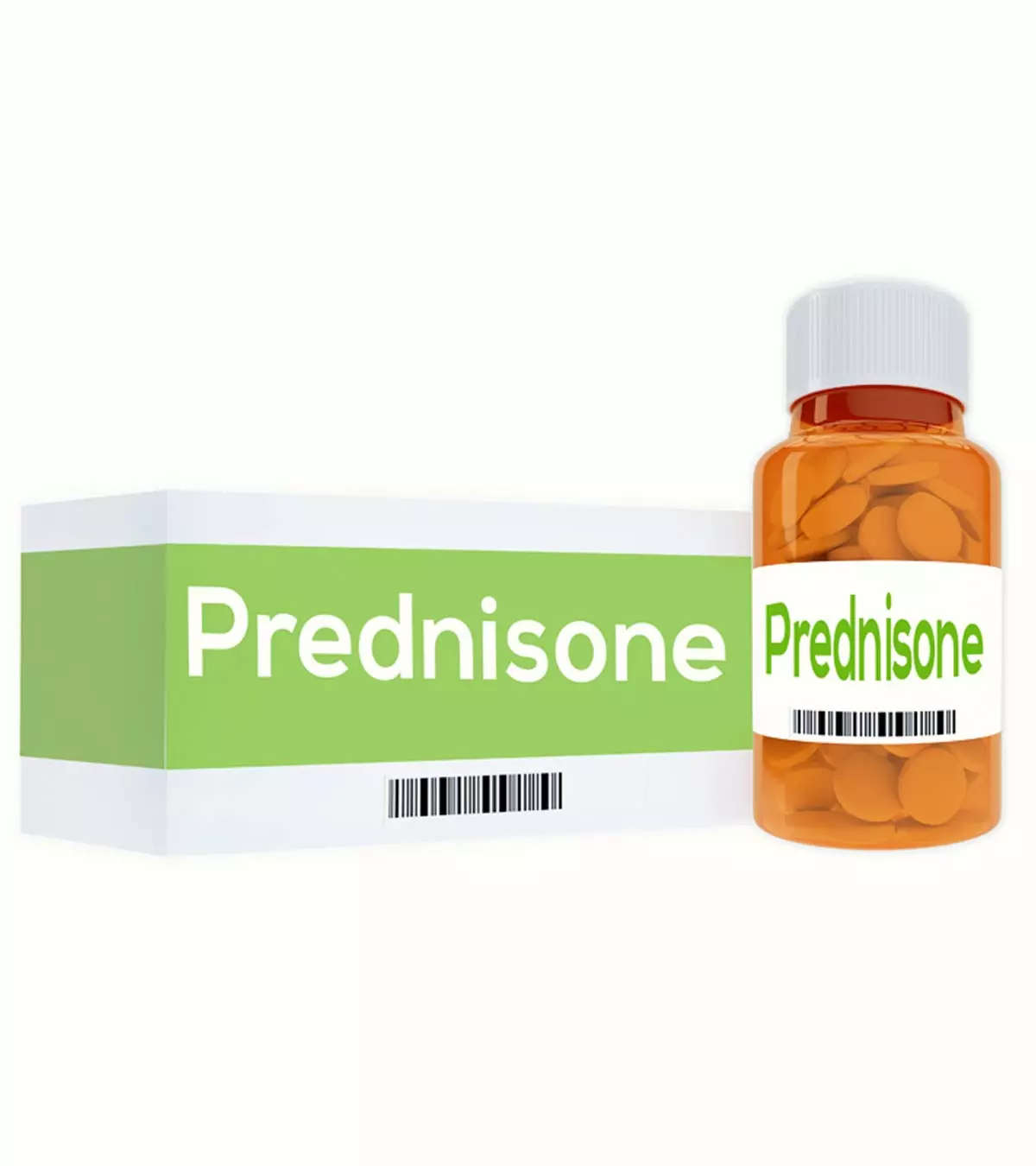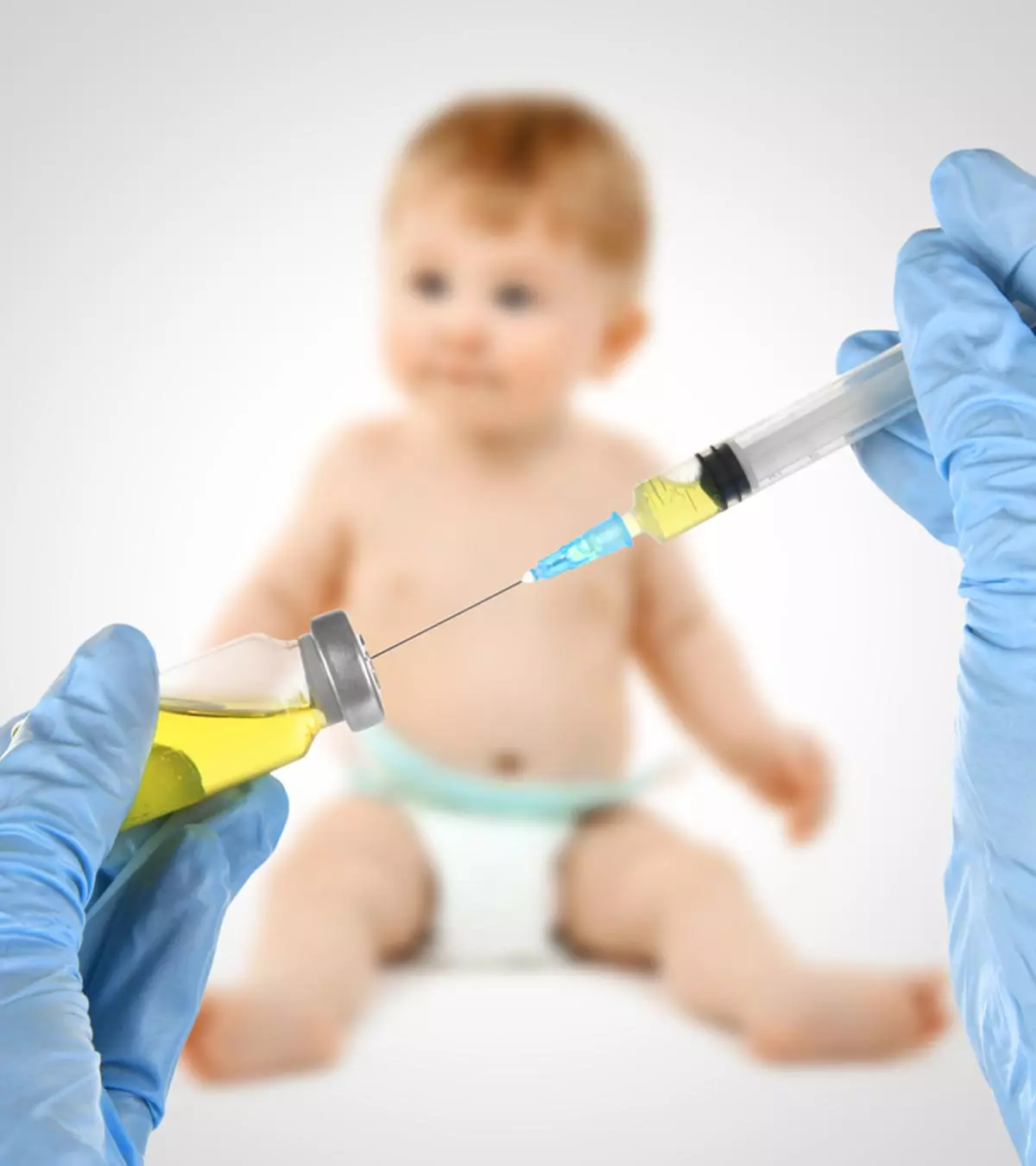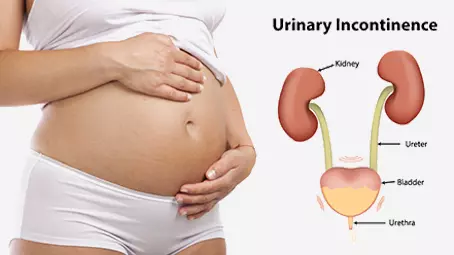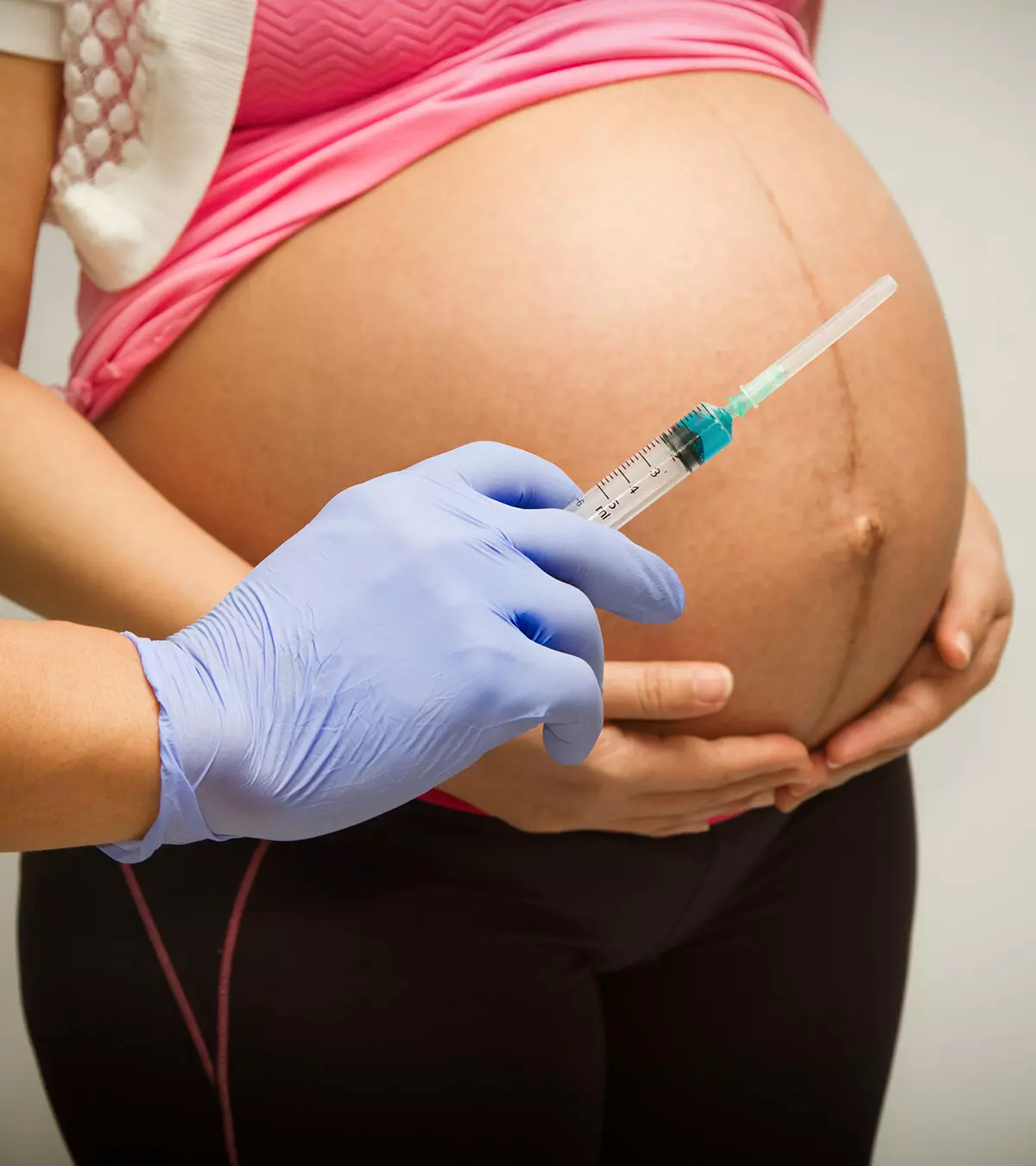
Image: Shutterstock
The doctor may recommend HCG injection during pregnancy for women who carry a high risk of miscarriage. Human chorionic gonadotropin (HCG) is a vital hormone in pregnancy. Women who experience hormonal problems while pregnant may need an HCG injection, which is given as a therapy to simulate the effects of the natural hormone HCG in the body. Read on to understand the significance, mechanism of action, and possible side effects of administering HCG injection in pregnancy.

Key Pointers
- HCG is a hormone produced by the placenta during pregnancy that regulates progesterone production.
- HCG injections are prescribed to women who have hormonal problems and are at a higher risk of miscarriage.
- HCG injections mimic the functions of the natural hormone in pregnant women and are also used to treat female infertility.
- Some people may experience allergic reactions to the HCG hormone, leading to symptoms such as dizziness, headaches, hives, and breathing difficulties.
- Some women may develop severe reactions to HCG injections, such as ovarian hyperstimulation syndrome, which requires medical attention.
What Is A Human Chorionic Gonadotropin Injection?

The Human Chorionic Gonadotropin is a natural hormone produced by the placentaiA temporary organ that delivers protection, nourishment, and oxygen to the developing fetus during pregnancy. .It supports the corpus luteum after fertilization of the ovum and also helps sustain the production of progesteroneiA hormone produced by a woman's ovaries, which is responsible for fetal growth and sustenance of pregnancy. throughout the gestational period (1).
This hormone supplement comes in the form of an injection that is given into a muscle under the skin. The FDA approves the HCG injection for treating selective cases of female infertility (2).
Why Are HCG Injections Given During Pregnancy?

HCG injections are given in some instances of recurrent pregnancy loss (RPL), which could be due to the unsuccessful implantation of the embryo to the uterine wall. It is important to note that fewer than 5 in 100 women experience two consecutive miscarriages, according to The American College of Obstetricians and Gynecologists. In some women, the fetal placental unit may secrete inadequate HCG hormone, which may result in insufficient progesterone production and, ultimately, embryo death. Thus, by administering HCG supplementation, the pregnancy could be sustained (3) (4).
Also, serum beta-hCG also plays a critical role in the early diagnosis of ectopic pregnancy.
How Does The Human Gonadotropin Injection Work Before And During Pregnancy?
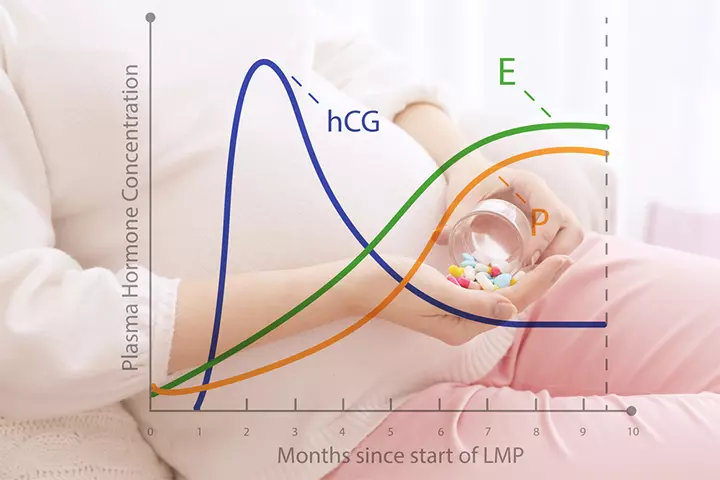
Before pregnancy, the HCG hormone stimulates the production of gonadal steroid hormonesiHormones that are produced by the gonads (ovaries/testes) and regulate reproductive processes. by stimulating the corpus luteum of the ovary to produce progesterone (5). Also, as the HCG is identical to the pituitary luteinizing hormoneiA vital reproductive hormone that facilitates the secretion of other hormones to support pregnancy. (LH), the HCG supplements could be a substitute for the LH hormone in triggering ovulation, as well as the development and maturation of the ovarian follicleiSmall sacs in the ovaries containing unfertilized eggs. .
During a healthy pregnancy, the HCG secreted by the placenta helps in maintaining the corpus luteum. It also supports the production of estrogeniHormone that plays a vital role in the development of sexual traits, supporting reproductive health. and progesterone during pregnancy for a successful gestation. So, the supplements mimic these reactions.
 Did you know?
Did you know?Is HCG Injection Safe During Pregnancy?

The HCG injection could help in sustaining the pregnancy in a few cases, but it does not mean that anyone can use it.
The US Food and Drug Administration (FDA) classified these HCG injections under ‘pregnancy category C,’ which means animal studies have shown adverse effects on the fetus, and there are no controlled studies in humans.
Your doctor might prescribe the HCG injection when its benefits outweigh the risks. Usually, this injection is given with fertility issues to support the early phases of pregnancy. Sometimes, fertility drugs for women are prescribed with HCG injections to treat fertility issues. So, it is best to consult your doctor and follow their advice.
 Quick fact
Quick factCan An HCG Injection Prevent Miscarriage?
There can be various reasons for miscarriage during pregnancy, ranging from genetic disorders to lifestyle factors. While HCG injections can help during ovulation and implantation, there is not robust evidence to show that they can prevent miscarriage (6).
What Are The Likely Side Effects Of HCG Injections During Pregnancy?

Here are a few possible side effects of HCG injections during pregnancy (7).
Allergic reaction: Some pregnant women could be allergic to gonadotropins. Visit your doctor if you experience the following symptoms of an allergic reaction after taking the supplement.
- Hives
- Difficulty in breathing
- Swelling of face, lips, tongue, or throat
- Pain, warmth, or tingling sensation in the arm or leg
- Confusion
- Dizziness
- Severe headache
Ovarian hyperstimulation syndrome (OHSS): A few women may develop this condition after the first treatment cycle. The condition could be severe and would need a doctor’s attention if you experience these symptoms:
- Severe pelvic pain
- Swelling of hands and legs
- Stomach pain and swelling
- Weight gain
- Diarrhea
- Nausea or vomiting
- Less urine output
- Shortness of breath
HCG injection during pregnancy helps sustain the pregnancy. It is given to women with fertility issues in the initial stages of pregnancy if the benefits outweigh the risks. The placenta naturally makes HCG hormones, and their levels help confirm the pregnancy. Although HCG injections may help prevent some causes of miscarriage in the early weeks, most miscarriage occurs due to genetic or lifestyle factors. Some women may experience side effects such as headaches, hives, and ovarian hyperstimulation syndrome after HCG shots. However, take HCG injections only per a certified doctor’s recommendation. Before starting the injections, be sure to inform them of any allergies or health concerns, particularly related to gynecological conditions like cysts or hormone-sensitive cancers, to ensure your safety.
This post is for informational purposes only and is not a replacement for a doctor’s consultation. Do not use any medication without talking to your doctor.
Frequently Asked Questions
1. What should I do after the HCG injection?
If planning to conceive, you should have intercourse within 48 hours of injection or an IUI within 36 hours (8).
2. Is the HCG injection painful?
The HCG injection is not significantly painful and may cause mild discomfort as any other injection. Pain at the injection site may occur as a side effect and go away in a few days (9).
3. When does the follicle rupture after HCG injection?
Various studies have shown that the first follicle rupture occurs about 32-38 hours after hCG injection (10) (11).
4. Can HCG shots cause twins?
A group study revealed that women who received HCG injections during intrauterine insemination treatment (IUI) might have increased chances of having a pregnancy with multiples (12).
5. How to administer HCG injection?
Wash your hands and clean the injection site with an alcohol swab. Read the instructions to see if the medicine needs mixing with a diluent. Draw the prescribed dose, inject at a 90-degree angle, and safely discard the needle. Store mixed leftovers in the fridge and unmixed medicine at room temperature. If unsure, talk to your doctor (7).
6. How much HCG do I have to inject to get pregnant?
A doctor will prescribe the appropriate dosage for injecting HCG, depending on your health condition. However, studies have shown that a typical dosage of HCG administration in intrauterine insemination procedures could be 5000 IU (11).
7. Can HCG injections be used for weight loss during pregnancy?
No, HCG drugs are not FDA-approved for weight loss and should only be used under a doctor’s supervision during pregnancy to prevent risks to both the fetus and the expectant mother (13).
Infographic: What You Should Know About HCG Injections During Pregnancy?
HCG injections are often used with other fertility medications to increase pregnancy chances. However, HCG is a vital hormone that also maintains pregnancy. Some women may need its injections even during pregnancy. Check out the infographic to learn some facts about HCG injections during pregnancy.
Some thing wrong with infographic shortcode. please verify shortcode syntax
Illustration: HCG Injection During Pregnancy: Can It Prevent Miscarriage?

Image: Dall·E/MomJunction Design Team
References
1. Megan Marie Moiser; Is the use of human chorionic gonadotropin effective as a weight loss regimen?; The University of Toledo Digital Repository
2. Questions and Answers on HCG Products for Weight Loss; US Food and Drug Administration
3. Elisabeth Clare Larsen, et. al.; New insights into mechanisms behind miscarriage; NCBI(2013)
4. Chelsea Fox, et.al.; Luteal phase HCG support for unexplained recurrent pregnancy loss – a low hanging fruit?; Reproductive Biomedicine Online Journal
5. Chorionic Gonadotropin for Injection, USP; US Food and Drug Administration
6. N.S. Qureshi, et.al.; First trimester threatened miscarriage treatment with human chorionic gonadotrophins: a randomised controlled trial; BJOB An International Journal of Obstetrics and Gynaecology
7. Human chorionic gonadotropin (HCG) (injectable); C.S. Mott Children’s Hospital; Michigan Medicine
8. Instructions For Ovulation Induction Cycles; Brigham and Women’s Hospital
9. Human Chorionic Gonadotropin, HCG injection; Cleveland Clinic
10. A.G. Andersen et al.; Time interval from human chorionic gonadotrophin (HCG) injection to follicular rupture; NCBI
11. Ilkka Y Järvelä et al; Improved pregnancy rate with administration of hCG after intrauterine insemination: a pilot study; NCBI
12. Shirley A et al., (2011); Multiple Pregnancy after Gonadotropin-Intrauterine Insemination: An Unavoidable Event?; NCBI
13. Avoid Dangerous HCG Diet Products; CDC
Community Experiences
Join the conversation and become a part of our nurturing community! Share your stories, experiences, and insights to connect with fellow parents.
Read full bio of Dr. Sangeeta Agrawal
Read full bio of shreeja pillai
Read full bio of Rebecca Malachi
Read full bio of Dr. Joyani Das






